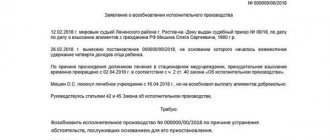Home » Alimony » Application to the prosecutor's office for non-payment of alimony
Alimony payments help a single mother or father stay afloat, support the child, develop him and do everything to ensure that the latter grows up as a normal person. And as a result, the lack of payments sharply reduces the capabilities of the child’s parent. It’s one thing when the delay is not too long and does not play a special role. And it’s completely different when the payer deliberately hides and does not want to fulfill his obligations under any circumstances. Is it possible to submit an application to the prosecutor's office to initiate a criminal case in such a situation?
Is it possible to contact the prosecutor's office for alimony?
The prosecutor's office does not have the right to supervise the defaulter, but monitoring the work of the executive service is one of its functions.
You should not remain idle if, due to the fault of the bailiff, the payment of alimony is delayed. Having received all the evidence, you should write a statement (complaint) to the prosecutor’s office and the process will go much faster.
Expert opinion
Stanislav Evseev
Lawyer. Experience 12 years. Specialization: civil, family, inheritance law.
You can, of course, speed it up on your own, for example, if the debtor is officially employed, take the writ of execution to the accounting department of his enterprise and submit it yourself.
The availability of real estate and other assets can also be found out through certain services. But you shouldn’t get carried away and do the bailiff’s job instead of him.
If there is no response to complaints, the head of the executive service and higher authorities should submit an application to the prosecutor's office. A correctly executed document will be quickly reviewed and the process will proceed at an accelerated pace.
Additional features and nuances
The recipient of funds has the right to use other methods of influencing the debtor. For example, he can begin to cooperate with the organization where the alimony worker is employed.
To do this, you will need to independently send a writ of execution to the company’s accounting department. The employer of the alimony worker will begin to collect the debt.
There are special services that can obtain information about the debtor’s real estate and other assets.
At the same time, it is not worth taking on all the work of a bailiff. If there is no response from the management of the executive service to the complaint, it is recommended to send a statement to the prosecutor's office.
As for the measures of influence on the alimony debtor, they are divided into administrative and criminal.
- fines, penalties;
- seizure of apartments, houses, cars, bank accounts;
- deprivation of a persistent defaulter of parental rights;
- deprivation of driver's license;
- ban on leaving the territory of the Russian Federation.
Criminal measures against a willful defaulter include arrest for up to 3 months and imprisonment for up to 12 months.
Grounds for contacting the prosecutor's office regarding alimony
As follows from the above, you can write a statement complaining about the bailiff’s negligent attitude towards his work.
This should not be done out of the blue, but if:
- the bailiff does not pay any attention to signals of non-payment, or even deliberately opposes receiving money for a child or other socially vulnerable person;
- the debt grows, and the employee, who is obliged to control the timely receipt of money, is inactive - does not hold the defaulter accountable, does not search for his property, does not calculate the alimony arrears;
- there are suspicions of a criminal conspiracy between the payer and an employee of the executive service - then you can submit an application to initiate a criminal case and check for a corruption component;
- proceedings on the collection of alimony have been suspended or terminated, and the reasons have not been clarified or are far-fetched.
As already written above, you can start by filing a complaint with the higher management of the executive service.
You can submit appropriate applications to the immediate supervisor of the bailiff, and if there are no results, to the organization at the city and regional level.
All complaints must be registered and responses saved. Such documents will be a good addition when submitting an application to the prosecutor's office.
Important! Usually the prosecutor's office checks all applications, but in some cases the application may be forwarded to the head of the “problem” bailiff under jurisdiction. To prevent this from happening, you must first contact the management of the FSSP department.
In order to know for sure whether the bailiff is engaged in enforcement proceedings in the case of alimony for a specific person, you should review the working documents on it.
To do this, the interested party writes a statement about familiarization with the materials of the enforcement proceedings. If the applicant intends to copy materials, he must indicate this in the application.
Arriving at the appointment, he can view, copy using his own copier or photograph the necessary papers. They will be needed as evidence of the negligence of the responsible employee.
Important! The alimony payer can also file a complaint against the bailiff if he discovers that the employee of the enforcement service is exceeding his authority in relation to him.
Complaint about the inaction of the bailiff executing alimony
The magistrate decided to collect alimony from the defendant for the maintenance of his minor son. Based on the court decision, a writ of execution was issued and transferred to the bailiff service for execution.
The bailiff did not take any action on the writ of execution, citing the fact that the debtor was absent from his last known place of residence. The bailiff was asked to establish the location of the debtor.
The applicant requests that the inaction of the bailiff in enforcement proceedings be declared unlawful and that the measures that must be taken for the proper execution of the court decision be determined. By the decision of the magistrate of court district No.____ _____________ district of ____________ region dated __________, it was decided from _______________________ to collect alimony for the maintenance of the minor son ______________________, born on _________, in the amount of _______________________. Based on the court decision, a writ of execution No. ___ dated _______ was issued, which was transferred for execution to the bailiff service of the city.
____________ __________ region.
In accordance with paragraph 10 of Article 30 of the Federal Law “On Enforcement Proceedings” dated October 2, 2007 N 229-FZ, if the executive document is subject to immediate execution, then after receipt by the bailiff department it is immediately transferred to the bailiff, whose powers extend to the territory where the execution should be carried out, and in case of its absence - to another bailiff.
According to the above law, enforcement proceedings are carried out on the principles of timely execution of enforcement actions and the application of enforcement measures (Article 4, paragraph 2).
The bailiff did not take any action on the writ of execution, citing the fact that the debtor was absent from his last known place of residence. The bailiff asked me to establish the location of the debtor.
While in accordance with paragraph 10 of Article 64 of the Law “On Enforcement Proceedings”, in the process of fulfilling the requirements of enforcement documents, the bailiff has the right to search for the debtor, his property, search for the child independently or with the involvement of internal affairs bodies. The same requirements are contained in Art.
65 of the above-mentioned law in the absence of information about the whereabouts of the debtor according to enforcement documents containing demands for the protection of the interests of the Russian Federation, constituent entities of the Russian Federation, municipalities, demands for the collection of alimony, compensation for harm caused to health or in connection with the death of the breadwinner, demands for the removal of a child , the bailiff, on his own initiative or at the request of the debtor, issues a resolution to search for the debtor, which is approved by the senior bailiff.
In the same manner, a decision is made to search for the debtor’s property or search for a child. Also, paragraph 2 of Article 65 of the Law “On Enforcement Proceedings” regulates the procedure for declaring a search for a debtor - the search is announced at the place of execution of the enforcement document: at the last known place of residence or place of stay of the debtor, the location of the debtor’s property or the place of residence of the claimant.
Based on Article 121 of the Federal Law “On Enforcement Proceedings” No. 229-FZ of October 2, 2007.
decisions of the bailiff and other officials of the bailiff service, their actions (inaction) to execute the writ of execution may be appealed by the parties to the enforcement proceedings, other persons whose rights and interests are violated by such actions (inaction), in the order of subordination and challenged in court .
recognize the inaction of the bailiff in enforcement proceedings No. ______ as unlawful and determine the measures that must be taken for the proper execution of the court decision. due to the lack of alimony from the moment of its establishment to the present and the lack of information on its receipt, being a claimant in enforcement proceedings, take actions to execute the writ of execution dated “____” __________ _____g. No. _________.
- the guilty perpetrator ignores his professional obligations dictated by a separate law. For example, it is necessary to introduce a ban on carrying out registration actions on transport, but the specialist does not do this;
- the implementation of the decision is properly documented, but in fact nothing has been done (fraud).
It turns out that winning a case in court is not enough for this decision to have positive results. In addition to the successful completion of the trial, the decision must be properly considered in compliance with the deadlines specified by law. Practice shows that this is often hampered by the inactivity of irresponsible performers.
In the event that no action is taken regarding the debt, a statement of claim for non-payment is not formed, it is necessary to respond to the inaction of the executor. First of all, you can complain to the immediate supervisor of a specific person, this is the head of the bailiff service department.
If there is no response, then the next step is to contact the FSSP department with a complaint. If this action does not bring the desired result, file a lawsuit. But there is another legal way to respond by contacting the prosecutor’s office with a complaint about the inaction of an official.
How to write an application for non-payment of alimony to the prosecutor's office?
There are no special requirements for the form of filling out such an application, but vice versa for the content. But all of them are dictated by established practice and general requirements of the legislation on citizens’ appeals.
The procedure for filing a complaint with the prosecutor's office is not regulated by any separate procedural document.
- The document should consist of three parts - header, narrative and operative.
- Thoughts should be presented clearly and concisely, without unnecessary additions or artistic expressions. If the applicant understands Russian legislation and can indicate the articles on which he relies, this is good, but you should not list them at random.
Content
| No. | Section name | Content |
| 1 | A cap | The personal and contact information of the applicant (full name, address, telephone number), as well as the information of the specific employee of the prosecutor’s office in whose name the application is being written are indicated. |
| 2 | Main (aka narrative) | The grounds for suspicion of inaction or criminal conspiracy are described, and the exact amount of the debt is indicated. |
| 3 | Resolute | It describes what actions were taken by the applicant and what happened as a result. The latter is supported by copies of complaints to the bailiff’s senior management, numbers of incoming documents, and responses to complaints. Circumstances must be stated in chronological order. The operative part consists of the justified demands of the alimony recipient. |
Important! The application must be drawn up correctly and clearly. Profanity and indication of circumstances unrelated to the case are prohibited. The writing is completed by indicating the date and the personal signature of the applicant. An anonymous application will not be accepted.
There are three ways to submit an application to the prosecutor's office:
- in the form of a registered letter.
- at a personal reception.
- in electronic form through a special website.
In the latter case, all documents (your own complaints, responses from the management of the executive service, passport, etc.) will have to be scanned and attached to the application as a separate file.
Sample application to the prosecutor's office
There is no strictly universal application form. The appeal is drawn up in free form with the most objective and reasonable presentation of arguments and other evidence.
You can use the sample below to draw up a document yourself, or you can first consult with a lawyer about the content of the appeal to the prosecutor.
Further actions
Expert opinion
Orlov Ivan Tarasovich
Legal consultant with 7 years of experience. Specializes in criminal law. Has experience in protecting legal interests.
Once the application is accepted by the prosecutor's office, there are 30 days within which it must be considered. The procedure looks like this:
- The information from the application is verified.
- A decision is made.
- The applicant receives notification of the results of the inspection.
Possible test results:
- No violations were identified.
- Minor violations were detected. The contractor is ordered to eliminate them within a limited time.
- Serious violations have been identified. The culprit is brought to justice.
FREE CONSULTATIONS are available for you! If you want to solve exactly your problem, then
:
- describe your situation to a lawyer in an online chat;
- write a question in the form below;
According to Art. 81 of the RF IC, both parents are equally obliged to support a child under 18 years of age.
These obligations do not add up even if the alimony payer is a pensioner, unemployed, convicted, or has another family with children. In practice, everything is not so simple - even wealthy fathers try in every possible way to disown spending on a child, believing that the divorce has put an end to family relationships, and he no longer owes anything to his former family.
An application to the prosecutor's office for non-payment of alimony can be submitted if the amount of debt is above 10 thousand rubles, and FSSP employees are inactive.
How to submit an electronic application?
In 2020, you can apply for a bailiff to the prosecutor’s office without even leaving your home. To do this you need to proceed as follows:
- Go to the website of the Prosecutor General's Office of the Russian Federation.
- In the Federal Districts tabs, select your region.
3. Go to the website of the prosecutor’s office in your region.
4. Click on the item Ask a question/answers to a request.
5. Click on the Button at the end of the page.
6. Fill out an appeal in the contact form.
When drawing up an application, you must take into account the following nuances:
- documents must be attached to the application that prove the information in the application (maximum volume is 3 MB);
- the application must be in the following formats : gif, jpg, png, bmp, eps, tif, txt, rtf, odf, pdf, doc, docx, ppt, pptx, xls, xlsx, avi, mov, mp3, ogg, wav;
- If the appeal requires the attachment of a larger volume of documents, the complaint must be submitted in writing.
What threatens the child support provider for non-payment of funds for the child?
In case of non-payment of funds, the alimony recipient faces criminal (arrest for up to six months or a prison term for a year or more) or administrative (calculation of fines, penalties, interest, sale of property, ban on driving a vehicle and crossing the state border) liability.
Dear readers, the information in the article may be out of date, take advantage of a free consultation by calling: Moscow +7
, St. Petersburg
+7 (812) 425-62-38
, Regions
8800-350-97-52
Results of filing an application with the prosecutor's office
Work on the document begins from the moment of its adoption. An employee of the prosecutor's office will check the stated facts, determine the degree of their veracity and take appropriate measures.
Among them:
- the requirement to eliminate the identified violations with informing the management of the FSSP about the need to respond;
- bringing to justice, in accordance with the law, by transferring materials to the investigative authorities - if signs of a crime are established.
The actions of the prosecutor may speed up the process of transferring alimony payments to the recipient. The bailiff will be controlled not only by the prosecutor's office, but also by his own management. An internal investigation may also be conducted.
Based on the results of the inspection, an administrative or criminal case may be initiated. The applicant is notified of the results of his appeal.
Important! As a result of the proceedings, the defaulter may also be held liable depending on the number of late payments and the total amount owed. In addition to administrative or even criminal liability, he may be charged a penalty for alimony.
An experienced lawyer is aware of the latest changes in legislation. Some of them can play into the hands of the applicant and help solve the problem of the bailiff’s negligence even without filing an application with the prosecutor’s office. But he will only be able to find out about this during a consultation.
If the matter comes to trial, the lawyer should be entrusted with drawing up a statement of claim to the court, or even better, entrusted with representing the interests of the client. You can get a preliminary consultation from the lawyers on our website. Application is free.
General rules for incentive payments
Measures that may be taken against the defendant: fines and penalties, seizure of property and a ban on leaving the country, deprivation of parental rights and control of a vehicle, administrative arrest and imprisonment.
Attention!
Arrest and imprisonment are measures that can only be taken for malicious evasion of parental obligations.
Any incentive measure is applied by court decision. A bailiff can initiate the proceedings. The payer has the right to speed up the process by filing an application to take measures against the defaulter. In fact, taking measures against an unscrupulous payer is the task of the bailiff. But due to the workload and low level of responsibility of the performers, the necessary actions have to be stimulated by filing complaints and statements.
The application of payment incentive methods to the alimony debtor can be initiated by the recipient, namely by writing a statement of non-payment. This is stated in Article 157 of the Criminal Code of the Russian Federation.
Penalties for the evader
When the court issues a writ of execution to bailiffs, the powers to monitor the situation regarding alimony obligations are transferred to them. That is, the bailiff is obliged to monitor the movement of funds from the payer to the recipient on a monthly basis. As soon as the amount of debt exceeds 10 thousand rubles, penalties may be applied to the draft dodger.
Administrative punishment
This measure allows the child support worker to remain free, but significantly limits his independence of movement. So, if there is a slight and initial delay in payments, a fine will be issued against him.
For each day of delay, penalties are imposed. If such measures are not scary, the bailiffs find the debtor’s property, bank deposits and seize them.
This means that the draft dodger does not have the right to make real estate transactions, sell and give away small property, or use accumulated money.
As soon as the debt is repaid, the arrest is lifted.
Additional penalties include a ban on leaving the Russian Federation, and it does not matter what the purpose of the trip is: for work, for vacation, for permanent residence or to say goodbye to a deceased relative. At passport control he will be stopped and asked to pay off the debt.
Documents regarding debts are submitted according to a summary to the traffic police; employees have the right to suspend the debtor’s rights and stop him on any section of the road. The right to drive a car is returned to him when the papers on non-payment of alimony are canceled by the FSSP.
Criminal liability
When it is obvious that the debtor is persistently, deliberately ignoring the requirements under the writ of execution and the resulting debt is over 4 months, the draft dodger becomes malicious and measures are applied to him under Art. 157 of the Criminal Code of the Russian Federation .
Under the article, the alimony holder faces correctional (forced) labor, arrest for up to 3 months, or full imprisonment for up to 1 year.







